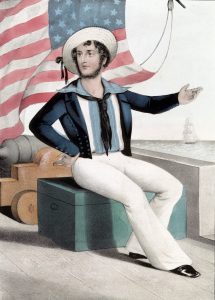Sea shanties are a type of song that were (usually) composed and sang on a ship. They’re very similar to classic folk songs such as “Greensleeves” or “Barbara Allen” in that they are old songs about the human experience. They sang of love, or tragedy, or funny events, or sex.These are aspects of life we can all relate to.
However these songs were different in fundamental ways. Many sea shanties were work songs. They weren’t exactly about work; they helped coordinate the many tasks about a ship. One typical example is a song called “Haul Away Joe.” The title, repeated every other line and also in the chorus, refers specifically to rope hauling, the kind that a sailor would do to raise a sail or yardarm. It’s the rhythm though that’s critical. The lines are sung in a “dah-dah” rhythm, and these musical phrases allow the rope haulers to time their efforts so the hauling would be coordinated. Think of this as similar to a drummer in a marching band, where the band members time their steps to the rhythm of a drum. Different songs were used in different circumstances, depending on whether quick action was needed or slower, plodding work.

Shanties weren’t just work songs. Many of them told stories. There were ballads of loves left behind, sad tales of shipwrecks, bawdy songs of encounters on the shore. These songs were performed more during the off time, especially night hours when it was too dark for crafts or repair work. One could still sing or play one’s instrument. Musical instruments were a common part of a sailor’s kit. After all, a sailor was going to be away for years possibly. Anything that would pass the time was welcome, and a well-played instrument was especially welcome.
Sea shanties have been passed down to us through an oral tradition and finally recorded during the early twentieth century by sailors and others who wanted to preserve this tradition. While we modern singers mostly sing them from these sources, keep in mind that songs that come from an oral tradition don’t often have official versions. Some, like “Heart Of Oak” the British navy anthem was written down to be sang in a specific way, many were passed from mouth to mouth, changing like a game of telephone. Many songs like “What Shall We Do With a Drunken Sailor?” were invitations for singers to contribute their own verses, sometimes composed on the spot. Only when a version was captured onto paper was a version made official.
And by the way, there is some confusion about how “shanty” is spelled. The origin of the word is a little unclear. It may come from the French verb “chanter” which means “to sing”, which is the same origin of the English word “chant”. There is no real agreement on this though, and the word has been spelled phonetically “shanty” for a long time. Either spelling is acceptable.
If you like Sea Shanties, join HVH2O on March 28 at Dramatic Hall. You will get the chance to hear Rick Nestler, former captain of the Clearwater and Sea Shanty singer. If you want to learn more about these songs, check out the following links:
http://www.dreadpirate.info/SeaShanties.htm


